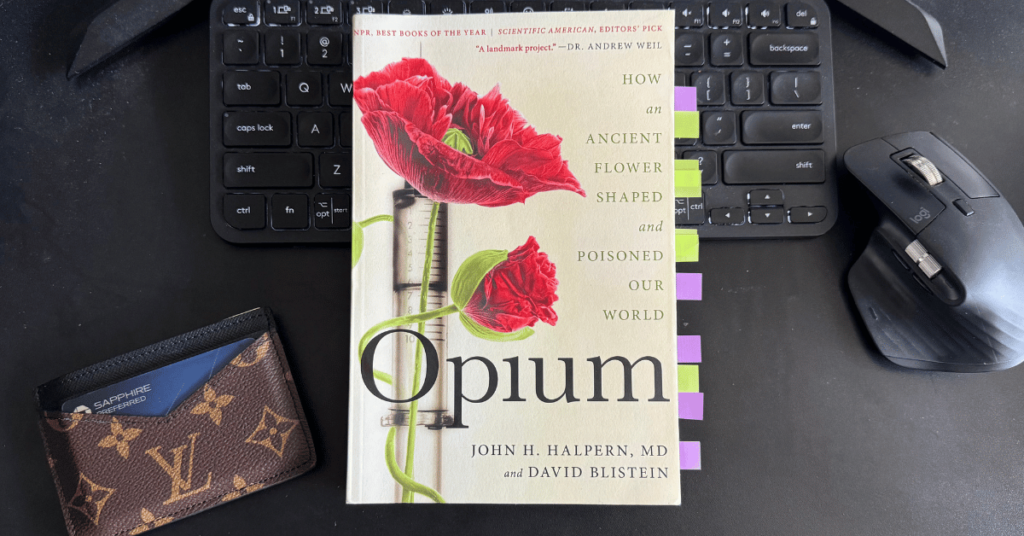Opium has been a part of the world throughout the beginning of time. Even dated in civilizations such as the Roman and Greek Empires, way back in the day.
The Book Opium – How an Ancient Flower Shaped and Poisoned Our World gives an overview on the rise and development of Opium as a drug and addresses the ultimate question – What do we do?

July 14, 2024 by Kazu Fujimoto
I thought the book was an interesting read and a great refresher if you’re interested in the subject of Opium from a Socioeconomic standpoint.
Here are some of the main takeaways I got from Opium.
Opium vs Alcohol and specific impacts of each
While Western leaders such as President Trump have accused Eastern labs of poisoning us with opium, people there speak with disdain about those in the West poisoning themselves with alcohol
– Opium
Western leaders accuse the East of poisoning with Opium, people there accuse the West of poisoning themselves with alcohol
The Odyssey provides examples such that the Greek used Opium
Helen of Troy had to frequently deal with Veterans of the Trojan War as a result of the PTSD they were going through.
For a concept such as this to be written in a dated book tells us that drug use could have been prevalent.
This also leads me to think how societal standards make us thing “drug use” is bad. (Of course there is bad associated with drug use, but there can be good)
Drug use provides those in need the ability to take care of their medical conditions.
Thing is the present have also occurred in the past.
Alexander the Great ushered in the rise of the Greek empire in spite of alcohol-opium psychosis
What interested me was that it seemed to be that many great leaders were in fact, opium addicts. Almost as if the opium gave them an edge in day to day performance.
Not suggesting you to take opium to be a world leader.
Whoever seeks fame need only become familiar with all that I have achieved
Galen
A double edged sword
If remedies to work back in the day, healers would be considered witches. If they didn’t work, they would be considered as charlatans.
Paracelsus
Paracelsus seemed to be quite the aristocrat. He was a physician, philosopher, astronomer, astrologist, alchemist, and last but not least, an opium eater. (Which goes back to what I mentioned earlier about many great figures in the world having some type of addiction)
Paracelsus has been the one to develop laudanum, which was an Opium based tonic.
All things are poison and nothing without poison; only the dose makes it so a thing is not a poison
Paracelsus
The United East India Company / The Dutch East India Company
Opium was a huge commodity that was widely traded between empires such as the English, Spanish, Portugese, and Chinese Empires. This even led to conflict between empires such as the English and Chinese and eventually led to that of the Opium wars.
Confucianism
Confucians were appalled at the idea of cutting into the human body.
Opium use became widespread in the history of China.
They were addicted by it.
Treaty of Nanking
As discussed, the conflict between the English and Chinese led to the Opium Wars, which led way to the Treaty of Nanking in 1842.
This resulted in giving the island of Hong Kong to the British and gave them access to Canton and Shanghai along with five ports farther north.
The treaty also resulted in ending many restrictions associated with trade.
There eventually became negotiation regarding matters such as extradition, taxes, and tariffs.
The British got a sweet deal. The Chinese emperor was outraged.
The Boston Tea Party
I hadn’t come across this term since I read history books in middle or high school.
The British Parliament passed the Tea Act in 1773, to save the East India Company. What they did was instead of raising tea taxes, they lowered them. This resulted in allowing the East India Company to be competitive regarding selling tea. Which led to tea smugglers such as John Hancock and misc. to dump tea to reduce supply and raise prices.
Purdue Pharma
Purdue Pharma and the Sackler family deserve writings and documentaries of their own. The Purdue Pharma company is a company owned by the Sacklers which would develop and distribute OxyContin – a painkiller that lead to the start of an epidemic of opioid addiction and overdoses.
Closing Thoughts
The book was interesting and gave a brief overview about the relevance of Opium throughout the history of time, without going too deep.
If you’d like to brush up on your general knowledge about Opium, I’d recommend you read it.
About the author of this book review

Kazuyoshi Fujimoto, PE
Founder | Engineering Career Coach | Principal Mechanical Engineer
Kazu oversees all of ultmeche’s engineering services. He provides consulting such as resume reviews, rewrites, mock interviews, and all services career related. Additionally, Kazu performs consulting work regarding Oil & Gas, Automotive, and Aerospace & Defense. Kazu is licensed as a professional engineer in the state of California and has 9+ years of experience in Oil & Gas, Automotive, and Aerospace & Defense.
In his spare time, he also enjoys reading books ranging from Fiction, Non-Fiction, History, Business, Economics, Biographies or anything that remotely interests him and likes to write about it.
As an Amazon Associate we earn from qualifying purchases. Certain content that appears on this site comes from Amazon. This content is provided ‘as is’ and is subject to change or removal at any time. Amazon and the Amazon logo are trademarks of Amazon.com, Inc. or its affiliates.
